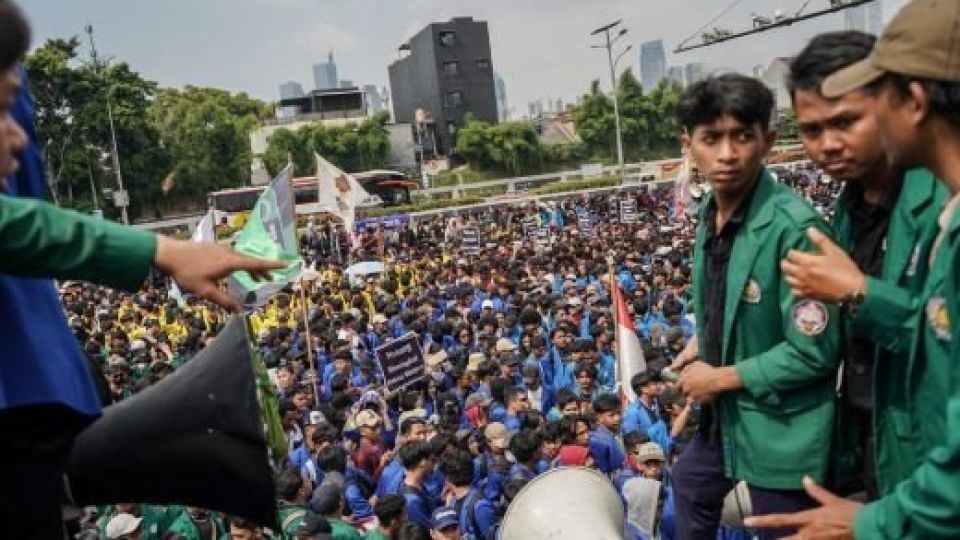August 30, 2024
JAKARTA – Lspan lang=”EN-ID”>Last week, social media platforms were awash with a cryptic blue image that went viral in less than a day, warning users of a potential constitutional violation in the country.
The image, which was a mock-up of a state of emergency alert screen taken from a YouTube video, came shortly after the House of Representatives planned to override the Constitutional Court’s rulings on the Regional Election Law. The plan would have favored the coalition of parties linked to president-elect Prabowo Subianto and outgoing President Joko “Jokowi” Widodo.
Although the picture only consisted of the national emblem, the Garuda Pancasila, on a blue background, its single line of “peringatan darurat” (emergency warning) about Indonesia’s state of democracy resonated with users across the country.
“After seeing these posts online, all my friends joined the campaign [by posting the image on social media],” Ahkamul Ihkam Mada, a law student at Hasanuddin University in Makassar, South Sulawesi, told The Jakarta Post on Tuesday.
Analysts and rights groups claimed that the image became one of the biggest factors driving thousands of students, activists, labor groups and public figures to rally in Jakarta and numerous cities on Aug. 22 to call on the lawmakers to abide by the court’s rulings.
By the end of the day, lawmakers eventually caved into the popular demand.
“This issue was the perfect opportunity for us to fight back against the many government policies that hurt our democracy,” said Ahkamul, who led the rally of students and professors from various universities in Makassar in front of the city’s legislative council building last week.
Social media power
Ismail Fahmi, founder of the big data consulting company Drone Emprit, said that the emergency warning posts were “highly influential” in inspiring people to join the rally because public figures were posting them to their millions of followers.
“When you see artists, academics, even stand-up comedians posting this ‘warning’ about the state of our democracy, it creates what’s called a confirmation bias that prompts people to learn about the issue, follow its campaign and not be afraid to speak up,” Ismail said on Wednesday.
Ahkamul of Hasanuddin University said the picture and the hashtag #KawalPutusanMK (protect the Constitutional Court’s rulings) immediately triggered a meeting among members of the university’s student executive board to form a plan for a rally in the city.
Bandung-based copywriter Kenny Andriana, 25, also claimed social media posts showing the rallies in the city motivated him to take to the streets and provide free food and masks for the protesters.
“I saw many posts on X about ojol [app-based ride-hailing motorcycle taxi] drivers giving protesters free rides and street food sellers providing free food, so that moved me and my friends to do the same,” Kenny said on Wednesday.
Youths’ influence on future protests
Ismail of Drone Emprit said he believed that the success of last week’s protests showed that social media would be even more pivotal in driving people’s opinions in the future. But he also said that such a movement would not be easy to replicate.
“The momentum that built last week also factored into the quick turnout of protesters, from the pessimism over the future of the court-ordered regional election rules to anger toward Jokowi’s youngest son Kaesang Pangarep and his wife over their foreign trip, it all created a unique virality,” he said.
Ismail pointed out how the 2019 protest against the controversial passing of the Job Creation Law became big online because fans of K-pop music dominated the conversation and popularized the hashtag #MosiTidakPercaya (vote of no confidence), which painted the movement’s uniqueness.
But Usman Hamid, the executive director of the human rights group Amnesty International Indonesia, said the students’ initiative to mass mobilize already helped the protests’ success and could be strengthened in future rallies.
“Without the power of students’ mobilization, the public’s criticism toward the lawmakers’ plan to redo the court’s rulings by trying to revise the Regional Elections Law would likely have been ignored,” Usman said on Thursday.
Verrel Uziel, who chairs the student executive board at the University of Indonesia (UI) in Depok, West Java, said the waves of students also proved that the younger generation, particularly members of Gen Z, born between 1997 and 2012, was “not as apolitical as many claimed”.
“Most of us who joined the protest were Gen Z, which shows how politically conscious we actually are,” said Verrel, who was also the rally’s leader for the university last Thursday.
“Hopefully, last week’s protest could spark the momentum for student movements to rise again […] because its success showed that public pressure remains an effective tool in bringing about change from the government,” he said.


